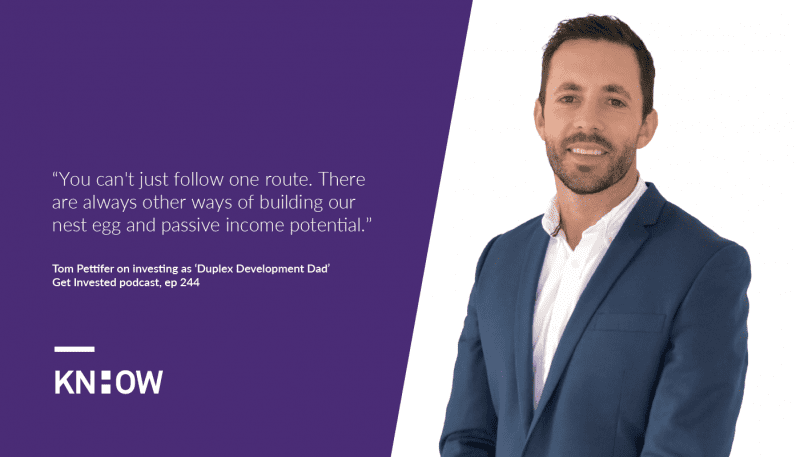Investor and ‘development Dad’ Tom Pettifer says you need to get creative when generating passive income through property.
Investing in property is not a one-size-fits-all, and sometimes investors need to become innovative with their strategy to suit their situation.
Tom Pettifer, better known as the ‘Development Dad’, joined Bushy Martin on the Get Invested to explain how you can confidently adapt your strategy to achieve your goals.
Why you shouldn’t hold off on investing
Your strategy for passive income needs to be adaptable to your circumstances, especially when life events, like children, and increases in interest rates, impact your borrowing capacity.
“Everyone’s strategy is going to be different depending on the goals, personal circumstances, borrowing capacity etc. You can be the smartest person in the room, but unless you take that action, you’re never really going to reap the rewards of leverage and the compounding interest,” Tom said.
“There are going to be downturns in the markets and so on. But if you can just stay the course persistently, stay resilient, and see it out for the long term and start as early as possible.”
Bushy added: “Don’t be stymied by the fact that you can’t just follow one route. There are always other ways of doing it and a range of activities you can use to maintain and continue to grow your opportunities.”
Leveraging residential properties to invest in commercial
For Tom, an effective strategy is to invest in residential property to build an equity base, which can be invested into a better performing asset with a higher yield, such as commercial property.
“I like to leverage residential first because you can actually grow your equity and actually create more wealth that way. Then once you’ve done that – depending on your circumstances, goals and timeframes – you can leverage it and transition into commercial,” he said.
“So I probably wouldn’t go out straight away and buy commercial. I think it’s more of a later play and more of a transitioning to retirement type asset. And I think it’s the way to go as well because living off the equity in the current lending environment doesn’t really work, and residential cashflow just doesn’t really cut it from a passive income standpoint. And that’s really where commercial makes sense, because the tenant pays out all the outgoings. So you’re looking at a net lease and that’s the big difference. And that’s where the cash flow is so much stronger than your standard residential property.”
The benefits of duplexes
Tom provided insight into his successes with investing in duplexes. These have essentially created ‘quick cash’ to become deposits for commercial properties.
“With the duplexes what I like about them is the risk isn’t much more than a standard house, and you can receive some pretty healthy returns on them,” Tom said.
“There are also lot of options with it. So depending on your needs, you can either hold onto both on completion, you can sell one and and hold one, or you can sell both. So essentially what you can do is you can create some great instant equity and you can accelerate your portfolio faster than potentially just doing it with a traditional approach.”
What commercial property should you invest in?
The size and type of commercial space will determine the quality of tenants and passive income you generate.
“The thing about commercial is you can buy quality assets at similar price points, it’s just all about the square metre rate. So unlike residential, where to get a good yield you might have to go out regional, with commercial you can still receive a really good deal, but you just buy a small space,” Tom said.
“Generally speaking, the larger the space, the longer tenant you’re going to have. And generally you’ll have a high turnover of the smaller commercial properties, but they’re smaller periods of turnover, whereas the larger ones are less often but they’re longer.
“But when I look at a commercial property, I always want to bring that ability or reusability of it. You need to plan for, if the tenant’s going to leave one day, how reusable is that space? So there are certain types of commercial assets I think you really want to be looking at. The main one that’s most popular now is the industrial warehouses and they’re very in demand products.
“I’d be staying away from the CBD office space, but properties with suburban retail and locations where there is good frontage and good foot traffic – they’re the good types of assets. But the industrial warehouse is probably the most low risk asset you can buy with the e-commerce boom happening and the need for space to tackle logistical issues caused by COVID. They’ve become really multi-use assets – they’re not just pigeonholed to one type of tenant or one type of sector.”
Listen to the full interview here.
Want to Know How you can build wealth with the help of leading, qualified experts? Check us out and talk to the team, now.




